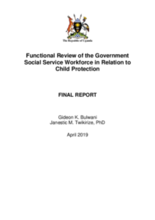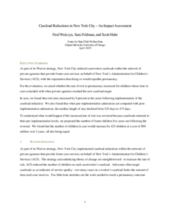Displaying 191 - 200 of 505
This podcast episode describes what self-harm is and how social workers can support young people and carers who are self-harming.
Despite the importance of training residential youth care professionals to increase their professional competences, little attention has been paid so far to the influence of training on the behaviour and skills of residential professionals. This study aims to gain greater insight into the effects of training on the skills of these professionals.
This 4th annual report from the Global Social Service Workforce Alliance includes a multi-country, four region review of the state of the social service workforce.
The Global Social Service Workforce Alliance hosted the 6th Annual Social Service Workforce Strengthening Symposium on the topic of using evidence as a catalyst for advocacy efforts to support the social service workforce.
This study explores understandings of children and childhood among 21 social workers from five child protection services in Chile.
This paper presents an overview of ChildHub, a peer learning and capacity-building network for child protection professionals initially developed and deployed in South-East Europe, and outlines a proposal for contextualizing ChildHub to Africa and South Asia.
This paper describes the development of an evidence-informed family therapy intervention designed for lay counselor delivery in low-resource settings and presents findings on the feasibility and acceptability of implementation in Kenya.
This report presents the findings of the “Functional review of the Government social service workforce in relation to child protection," which aimed to inform efforts geared towards strengthening the functionality of the social service workforce in Uganda, taking into account changes in the legal and policy framework and global trends in social protection and child protection in particular.
For this evaluation, the authors asked whether the rate of exit to permanency increased for children whose time in foster care in New York City coincided with when private foster care agencies reached the new reduced caseload target.
The importance of mental and behavioral health for child welfare clients is well-documented; yet, little is known about the challenges therapeutic service providers (TSPs) experience working in child welfare practice. To explore this topic, five focus groups were conducted with 40 TSPs in a contracted mental and behavioral health agency and data were analyzed following an inductive thematic process.



